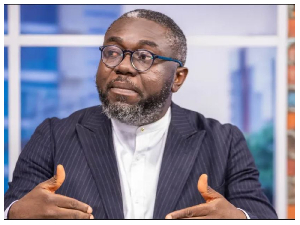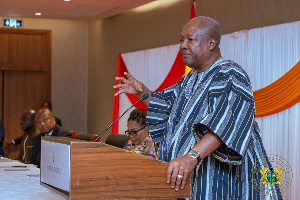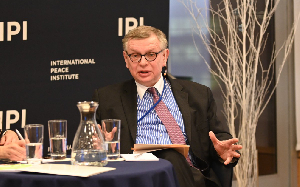Political patronage is a key challenge to the fight against corruption in the country. Patronage is the use of state resources to reward individuals or groups for their electoral support. The patronage system flows from the concept of the ‘spoils system’ to which “to the victor goes the spoils”. In Ghana, the system is underlined by the fact that an elected president is given the right to appoint a number of persons to jobs in the government. Under the 1992 Constitution of Ghana, the president can appoint an indeterminate number of ministers of state and deputies and diplomatic representatives (ambassadors). Under Section 70 of the Constitution, the president is also allowed to appoint the Commissioner for Human Rights and Administrative Justice and his deputies, Auditor-General, District Assembly Common Fund Administrator, and Chairman, Deputy Chairmen and Members of the Electoral Commission in addition to the Chairmen and other members of the Public Services Commission; Lands Commission; and the governing bodies of public corporations. Appointments by politicians are not always determined by objective criteria of merit rather than on the basis of political support and work. There is a real danger of favoritism and corruption in the award of contracts and appointments by a president to groups, families and ethnicities.
Under the democratic dispensation of the Fourth Republic of Ghana, there have been two major changes in government although there have been five key national elections. The transition from the Provisional National Defense Council (PNDC) to the first National Democratic Congress (NDC) government under President Rawlings in 1993 did not witness major changes as the leadership of the two regimes was the same. However, the change in government in 2001 from President Rawlings to President Kufuor witnessed massive changes in personnel at various levels of the government machinery. Perhaps out of fear for over familiar and long serving faces under the previous regime, and, in some cases, the desire to reward their own supporters, the government of President Kufuor removed and transferred many individuals from their positions. It is sometimes alleged that some of the people who were removed were not political appointees but public servants who are expected to be neutrals with secured tenure from the political establishment. The situation further trickled down to the point where some individuals linked to the New Patriotic Party (NPP) of President Kufuor were alleged to have taken over public places of convenience as compensation for their roles in bringing about the electoral victory of the New Patriotic Party. Many critics of the government condemned these removals and replacements, particularly, in the public service. Of note was the Hodari Okai case where a public official who was removed had to resort to the law court for redress. This became an electoral campaign tool of the then opposition NDC in 2008 and subsequently rewarded the gentleman with an ambassadorial position in coming to office in 2009.
Interestingly, the change in government in 2009 from President Kufuor to President Mills also witnessed the same system of wholesale change in personnel. Some political watchers trace the ‘falling-out’ between Presidents Mills and Rawlings to the speed with which the former chose to replace the appointees of President Kufuor upon assumption of office in 2009. In a response to question for replacing Prof. Ken Attafuah, former head of the National Identification Authority – an official appointed by his predecessor – President Mills stated that he could only work with people who share his vision. The year 2009, and a little beyond, saw unprecedented occurrences of seizure of public facilities by supporters of NDC. Some of these supporters, often called foot-solders, have gone beyond seizing public places of convenience to the taking over of offices of National Health Insurance Scheme and National Youth Employment Programme (NYEP), and buses of Metro Mass Transit Ltd. In addition some of these foot-soldiers have successfully engineered the removal of many District Chief Executives, managers and staff of National Health Insurance schemes and officials of NYEP. Some of the actions were through agitations and others through forceful removals and threats of violence. Indeed many of the supporters of the NDC have since 2009 demanded to be given top jobs and ‘juicy’ government contracts. Some have even argued that they deserve of positions comparable with that of ministers of state and ‘top dollar’ contracts. It is interesting to recollect an incident in April 2010 when some activists of the NDC began violent demonstrations in Yendi to remove the then Municipal Chief Executive for not giving government contracts to the members of the NDC. An activist of NDC in Tamale called Mohammed Aboagye in ‘slugging’ it out with the Deputy Minister of Local Government, Elvis Afriyie Ankrah, on the network of Joy FM stated that if the ‘foot-soldiers’ were good enough to work to bring the NDC into power they were good enough to occupy high offices and take up juicy government contracts like the minister. Over two years into the administration of Prof. Mills foot-soldiers’ agitations for removing public officials including District Chief Executives (DCEs) have not subsided. It is of significant note that the DCEs chair the District Security Councils therefore the effect of such attacks on them cannot be overemphasized as it extends to the total security of country. This informs the fear and open admission of inability by the police to investigate crimes committed under the umbrella of politics.
It is the prerogative of the president to appoint key persons to assist him/her. The danger however stems from appointments based on nepotism and cronyism. However, an elected president is inherently entrusted with the sovereign will of the people and must be allowed to select key persons to enable him/her execute the mandate given by the people. Patronage as a system has got significant merits making it even desirable. It provides an avenue for maintaining a strong political organization by offering campaign workers rewards. Significantly, patronage puts people into government who agree with the political agenda of the elected president. Further, cooperation, loyalty and trust flow from the patronage system. Finally, the arrangement guarantees some turnover, bringing new people and fresh ideas into the system.
In Ghana, unlike in some other democracies, politics is played throughout the political cycle of four years. With next year being an election year, we find the electoral temperature already reaching a crescendo. The NPP is on its final leg towards conducting constituency primaries to elect parliamentary candidates for Election 2012. The NDC is also preparing towards electing a presidential candidate for next year’s election. Sadly, there have been instances of individuals within the camps of President Mills and Nana Konadu Agyeman Rawlings throwing unsubstantiated allegations and insults. The situation is quite unfortunate as this is even at the intra-party level. The intemperate language of some people leaves much to be desired. At the risk of being targeted for insults, yours truly is most worried by some young men operating under the name of FONKAR (Friends of Nana Konadu Agyeman Rawlings). It is very sad to hear some of the words they use against President Mills and his appointees. Some political watchers have cautioned for decorous language since any fall out can affect the electoral fortunes of the ruling party in the up-coming elections in 2012.
It is worthy of note that a patronage system not only rewards political supporters for past support, it also encourages future support because persons who have a patronage job try to retain it by campaigning for the party at the next election. It is not strange therefore for some ‘die-hard’ supporters of President Rawlings to have openly defied him in their support for President Mills’ candidature. It was interesting to hear individuals like Mr. Fiifi Kwettey, Deputy Minister for Finance and Mr. Alban Bagbin, Minister for Water Resources, Works and Housing espousing the virtues of President Mills as the best choice to lead the NDC into Election 2012. This is clearly at variance with the reported support of President Rawlings for his wife Nana Konadu Agyeman’s as a preferable option to the sitting president for the NDC presidential candidature. Mr. Kwettey indicated in interviews that he is standing by his conviction based on his mentor’s (President Rawlings’) principles of ‘positive defiance’ and abiding by ones conviction. Prior to his appointment by President Mills, Mr. Bagbin openly criticized the president and extolled the former president for standing for the principles underlying the foundation of the NDC. Mr. Bagbin went as far as calling the president’s key advisors as ‘fair weather friends’ but has now significantly changed his opinion, obviously after becoming an insider with his appointment as a minister. The minster in a radio interview on Good Friday, April 22, 2011 stated that it was important for the NDC to stick with President Mills as its candidate stating that the reason for President Rawlings’ rejection of the sitting president is the result of lack of information. From a purely neutral stance, yours truly believes the electoral success of the NDC would be better served with President Mills as its candidate. It will surely take a political hurricane for the former first lady to defeat the president in the NDC primaries. Many political watchers have openly wondered the need for the challenge in the first place. Some have opined that the very challenge to a first term president by a member of his party, unprecedented as it, poses a lot of questions the opposition parties would use should the president be returned as the candidate of his party in Election 2012. It should not be difficult though to observe that many of the vociferous supporters of Mrs. Rawlings have not befitted from the political largesse they were expecting under an NDC government. Such individuals may believe that their personal fortune would be better served under a Nana Rawlings’ presidency. Mr. Ekwow Spio Garbrah has openly expressed his disappointment at not being given a government appointment and has openly labeled current ministers as ‘Team B’. His criticism of the government can at best be seen in the light of his personal failure to grab a position in the Mills government. The reason for the obvious fall-out between the president and the former first family remains unclear. We are yet to know the full story of the governing NDC.
At the inter-party level, the NPP has appointed a directorate of communication headed by Nana Akomea, a member of parliament and a former minister. He is assisted by a team of over eight (8) deputies. Flowing from the appointments given to the NDC team of ‘Setting the Records Straight’ during the 2008 elections, the members of the NPP Communication Team must be looking forward to getting one appointment or the other should Nana Akufu-Addo be elected president in 2012. Such huge expectations have accounted for the syndrome of ‘foot-soldier agitations’ in the politics of the country. Ministers and NDC functionaries prior to the commencement of their defense of the president in the expected contest with the former first family (the Rawlingses) had consistently been training their guns on the NPP Presidential Candidate, Nana Akufu-Addo. Recent insults of Nana Akufu-Addo and Ms. Ursula Owusu of the NPP by Mr. Kobby Acheampong, Deputy Minister for Interior and Dr. Hannah Bissiw, Deputy Minister for Water Resources, Works and Housing, respectively can clearly be seen as political work being done in the expectation of being maintained (or even promoted) should President Mills be returned for a second term.
Politicians are doing the country a great disservice with the unrealistic promises they make prior to elections. It is most unfortunate and unacceptable for aspiring members of parliament to make promises which can never be fulfilled. The hopes and aspirations of supporters are driven fever high by promises of politicians during the electioneering period only to realize they are not being fulfilled after elections. This leads these impressionable party youth to vent their frustration through illegal and violent methods including vandalism of state and private properties and assault of persons. The recent burning and vandalizing of NDC offices by its own supporters in Tamale after the verdict on the Ya Naa trial is a classic case of electoral promise gone sour. Elected officials – president and members of parliament – must not unnecessarily raise the expectation of their supporters for political expedience.
Ghana can pick lessons from the American experience when in 1881 President James Garfield was assassinated by a disgruntled office seeker who did not receive a political appointment. The incident spurred the American Congress to pass the Civil Service Act of 1883 culminating in the creation of the Civil Service Commission and advocated a merit system for the selection of government employment. Statistics shows that by 1980, 90 percent of all federal positions in the US had become part of the civil service system. Further legislations including the Hatch Act of 1939 have also curtailed or restricted significantly most partisan political activities of federal employees. In Ghana, the Public Services Commission Act, 1994 (Act 482) and Public Procurement Act, 2003 (Act 663) could have helped in reducing corruption in public sector appointments and procurement, respectively. However, there are allegations against the Mills administration of making appointments and procurements without going through due process prescribed by these laws. There is a litany of allegations against the administration of President Mills with overusing sole sourcing as the mode of public procurement. The foregoing problems associated with the current patronage system therefore calls for public debate to find solutions to the problem.
Some considerations to engage our minds would include passing legislations on public appointments. The constitutional provision on the president’s power to appoint must be clarified for greater openness and accountability. There must be a ceiling put on the number of ministers, ambassadors, advisors and aides the president can appoint. Further, a more open and meritorious system must be used to ensure the best qualified are appointed. Parliament as representatives of the people must be entrusted with the oversight responsibility for screening more of the presidential appointees. The Public Procurement Act must be reviewed and the necessary amendments made to remove the loopholes and also the award of contracts from the local to the national level should also be subjected to the scrutiny of parliament. Overall, there must be greater openness in governance with civil society organizations and the media playing key roles in ensuring adherence to the letter and spirit of anti-corruption legislations and abiding with moral code of conduct expected by the society. Finally, while accepting that patronage at the highest levels of government is acceptable and even desirable, extending it far lower down the organizational chain makes it susceptible to inefficiency and corruption.
God bless Ghana
Kofi Nyame
Gbawe – Accra
kofinyame@gmail.com
Opinions of Monday, 25 April 2011
Columnist: Nyame, Kofi














